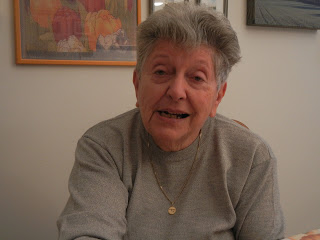Assisi
Just
a couple of weeks ago, I found out that Graziella Viterbi comes to
Assisi every year and that she had been here, but had already left,
much to my disappointment. With the assistance of the owner of the
hotel where Graziella stays, I called her at home and we arranged for
“una intervista” a Roma. And so it happened that yesterday
morning I took the train to Rome for an interview with this most
interesting and gracious woman.
Although
Graziella is also fluent in English and French, we both preferred to
speak in Italian and, except for a few instances when I wanted to
make sure that I had correctly understood, our interview was
conducted “in italiano” which made the experience even more
extraordinary for me. Much of what Graziella told me has already been
recounted in a prior blog entry, but I would still like to tell it
again as these are the words of a courageous woman who lived the
experience.
With
the passage of the Racial Laws of 1938, life for the Jews in Italy
changed dramatically. In the beginning, Graziella, who was still a
young girl, didn't mind the changes much as the laws only deepened
her pride in being Jewish. As she told me, "if they didn't want us,
it was okay with me." With the passage of time, the level of
anxiety and danger increased and with the arrival of the German army
in Italy, it was clearly a signal to leave Padua. The family was on
holiday at the time and the owner of the inn (a Fascist who "walked
both sides") where the family was staying suggested that they go to
a place further up in the mountains. After a month there and with the
weather turning much colder, it became an untenable situation. The
German commander was told that Graziella's father was ill and
permission was granted to the family to return home. They traveled
south and, after stopping in Roma, continued on to Assisi where they
spent one month in two rooms at a small albergo (Hotel Sole which is
still operating) near the Piazza Santa Chiara. It was during this
time that Graziella's father met a friend from Padua who told him of
the clandestine operation to assist the Jews. Signore Viterbi went to
the Vescovo (bishop) seeking help; thus began his (and his family's)
relationship with Monsignor Nicolini and Don Aldo Brunacci.
When
I asked Graziella if she was scared, she told me that she wasn't
afraid, although she said that it was more difficult for her younger
sister Mirjam who, at ten years old and too young to understand, knew
that papa and mamma were preoccupied, although outwardly remaining
calm and not appearing to be nervous.
In
the early spring of 1944, the family was advised to try and find
another place to live as there were getting to be too many Jews in
Assisi and there was concern for their safety. Graziella and her
mother went to Perugia in search of a house and found a flat to move
into. Shortly before the scheduled move (April/May), Signora Viterbi
received news that family members had been deported. Distraught, she
did not want to leave her home in Assisi. This turned out to save her
family's life because, shortly after the scheduled move to Perugia,
a bomb destroyed what would have been their new home.
With
the arrival of the Allied forces in June,1944 (English troops that
included a Palestinian Brigade made up of Jewish soldiers), there was
great rejoicing, although the family then had to decide what to do.
As their palazzo in Padua had been partially destroyed by a fire
(occuring during a Fascist party) and there were no funds to repair
the damages, the Viterbi's decided to stay in Assisi for the
meantime. Graziella's father secured a position teaching in Perugia,
but after seven years, the family moved to Roma where Signore Viterbi
taught at the university and Graziella and Mirjam continued their
schooling. Graziella, who received a degree in criminology, went on to
receive a diploma in Social Service, a career she was devoted to for
many years.
When
asked about Colonnello Muller, Graziella had nothing but words of
praise for this German comandante who undoubtedly knew what was going
on, but never said anything...un segreto nascosto (a hidden secret).
Infatti (in fact), after the war, Graziella and her family developed
a strong friendship with this courageous man and his family and they
visited one another, both in Rome and Germany.
The
2.5 hours I spent with this lovely woman went by quickly, but there
was still enough time to talk of other things personal about her life
and mine and what we hold in common. We ended our visit with her
sharing family photos and my taking pictures. I left Graziella's
apartment with much gratitude and joy and a smile as I thought about
one of her stories which I will share with all of you...
One
day, while the family was in Assisi, Don Aldo gave Graziella false
documents to bring to some other families. It was felt that if a
young teenage girl was seen as simply taking a stroll that no one
would be the wiser. Graziella, who was very proud to be carrying the
documents, happened to pass by a German sentinel who, as she said, "looked at me
like I was a normal person." She was so full of pride (molto fiere)
after completing her mission, that, being a fearless ragazza of 17
years old, Graziella made it a point to walk in front of the German soldier
yet again. In her words..."I had the pleasure to do something."
...And in mine, "Yes, you did, Graziella Viterbi...and I thank you."





No comments:
Post a Comment